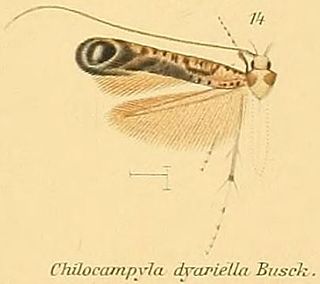
Eugenia is a genus of flowering plants in the myrtle family Myrtaceae. It has a worldwide, although highly uneven, distribution in tropical and subtropical regions. The bulk of the approximately 1,100 species occur in the New World tropics, especially in the northern Andes, the Caribbean, and the Atlantic Forest of eastern Brazil. Other centers of diversity include New Caledonia and Madagascar. Many of the species that occur in the Old World have received a new classification into the genus Syzygium.

Gracillariidae is an important family of insects in the order Lepidoptera and the principal family of leaf miners that includes several economic, horticultural or recently invasive pest species such as the horse-chestnut leaf miner, Cameraria ohridella.
Acrocercops tristaniae is a moth of the family Gracillariidae. It is known from Queensland, Australia.
Macarostola formosa is a moth of the family Gracillariidae. It is known from Australia and New Zealand.
Macarostola eugeniella is a moth of the family Gracillariidae. It is known from Madagascar and Mauritius.
Conopomorpha litchiella is a moth of the family Gracillariidae. It is known from Australia, China (Fujian), India, Malaysia (Selangor), Nepal, Taiwan and Thailand.
Acrocercops loxias is a moth of the family Gracillariidae. It is known from India (Rajasthan) and Madagascar.
Acrocercops allactopa is a moth of the family Gracillariidae, known from Karnataka, India. The hostplants for the species include Eugenia cumini and Eugenia jambolana.
Acrocercops argodesma is a moth of the family Gracillariidae, known from Java, Indonesia. The hostplant for the species is Eugenia cumini.
Acrocercops bisinuata is a moth of the family Gracillariidae, known from Sri Lanka and India. The hostplant for the species is Eugenia malaccensis.

Chilocampyla dyariella is a moth of the family Gracillariidae. It is known from Florida, United States.
Chilocampyla psidiella is a moth of the family Gracillariidae. It is known from Cuba.
Macarostola phoenicaula is a moth of the family Gracillariidae. It is known from Fiji.
Macarostola gamelia is a moth of the family Gracillariidae. It is known from Java, Indonesia.
Macarostola zehntneri is a moth of the family Gracillariidae. It is known from Maharashtra, India; Java, Indonesia; and Malaysia.
Acrocercops chrysophila is a moth of the family Gracillariidae, known to be from Uttarakhand, India. It was described by E. Meyrick in 1937. The hostplants for the species include Eugenia cumini and Eugenia jambolana.
Acrocercops telestis is a moth of the family Gracillariidae. It is known from India (Bihar).
Acrocercops eugeniella is a moth of the family Gracillariidae, known from Java, Indonesia, as well as Thailand. It was described by W. van Deventer in 1904. The hostplants for the species include Eugenia aquea, Eugenia cumini, and Eugenia javanica.
Acrocercops phaeospora is a moth of the family Gracillariidae, known from Karnataka, India. It was described by Edward Meyrick in 1916. The hostplants for the species include Vigna mungo, Vigna unguiculata, Cleistocalyx operculatus, Eugenia cumini, Eugenia jambolana, Syzygium littorale, Madhuca latifolia, and Theobroma cacao.

Gracillariinae are a subfamily of moths which was described by Henry Tibbats Stainton in 1854.



